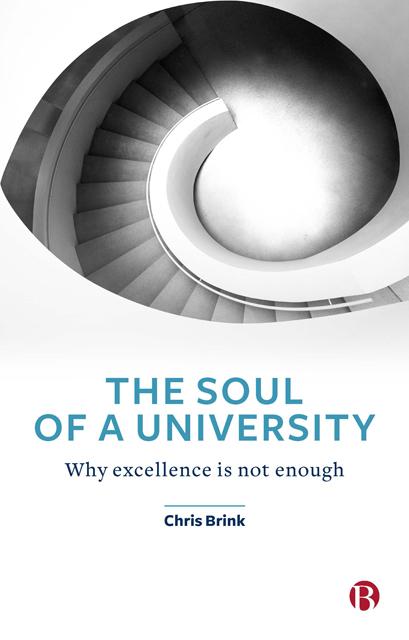Book contents
- Frontmatter
- Miscellenous Frontmatter
- Dedication
- Miscellenous Frontmatter
- Contents
- List of Illustrations
- List of Abbreviations
- Acknowledgements
- Prologue
- Introduction
- 1 The Standard Model University
- 2 Rankings and League Tables
- 3 Quality in Higher Education
- 4 Tales of Quality, Equality and Diversity
- 5 Rank Order of Worth
- 6 Linear Thinking
- 7 Another Dimension
- 8 Ideas of a Civic University
- Epilogue On the Supreme Good, by Boethius of Dacia
- Notes
- Index
8 - Ideas of a Civic University
Published online by Cambridge University Press: 21 April 2023
- Frontmatter
- Miscellenous Frontmatter
- Dedication
- Miscellenous Frontmatter
- Contents
- List of Illustrations
- List of Abbreviations
- Acknowledgements
- Prologue
- Introduction
- 1 The Standard Model University
- 2 Rankings and League Tables
- 3 Quality in Higher Education
- 4 Tales of Quality, Equality and Diversity
- 5 Rank Order of Worth
- 6 Linear Thinking
- 7 Another Dimension
- 8 Ideas of a Civic University
- Epilogue On the Supreme Good, by Boethius of Dacia
- Notes
- Index
Summary
A sense of purpose
Knowledge is the object of our enquiry, and men do not think they know a thing until they have grasped the ‘why’ of it.
Aristotle, Physics, Book II
There are two key questions every university should ask itself about its academic work. The first is: What are we good at? And the second is: What are we good for?
The good-at question takes us back to the standard model university and the closing discussion of Chapter One. With Wilhelm von Humboldt we believe that research is a core function of the university, and with John Henry Newman we believe that teaching is a core function of the university. Our response to the question ‘What are we good at?’ is therefore usually phrased in terms of these two core functions. More specifically, it is phrased in terms of our academic disciplines: what we teach, and which subjects we do research in.
So, in response to the question ‘What is your university really good at?’, the standard model academic will reply that it is really good at mathematics, or biology, or history, or medicine or engineering. The first subtext of that response is usually that the university is really good at research in these disciplines, an assertion which can then be substantiated by metrics of publications, citations, rankings and league tables. Alternatively, but not excluding the first answer, the second subtext is about the education offered within the disciplinary structures: the university has a really good law faculty, or business school, or philosophy department, or conservatory of music. Which again can be substantiated by metrics: perhaps a national student satisfaction survey, or teaching rankings, or employment statistics, or eminent alumni.
Now what about the good-for question? As discussed in Chapter One, there are many standard model academics who believe that a strong response to the good-at question will suffice, by itself, as a response to the good-for question as well. This is the argument about knowledge for its own sake, so eloquently articulated by Newman, and supplemented by the evidence of the invisible hand at work in the long-term usefulness of curiosity-driven research.
- Type
- Chapter
- Information
- The Soul of a UniversityWhy Excellence Is Not Enough, pp. 285 - 334Publisher: Bristol University PressPrint publication year: 2018



